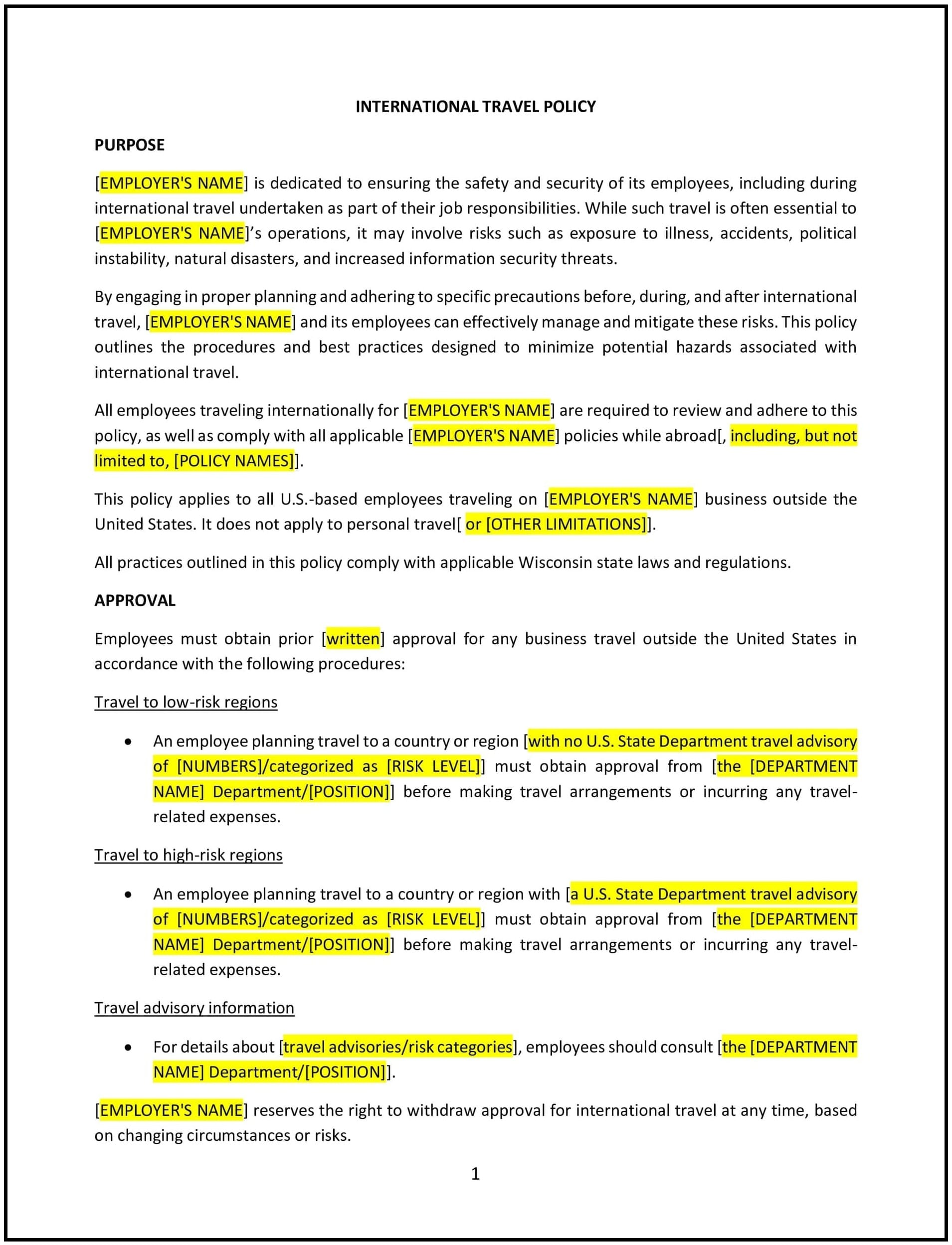International travel policy (Wisconsin): Free template
Got contracts to review? While you're here for policies, let Cobrief make contract review effortless—start your free review now.

Customize this template for free
International travel policy (Wisconsin)
An international travel policy helps Wisconsin businesses manage and regulate employee travel for work-related purposes outside the United States. This policy outlines the company’s expectations regarding travel planning, safety, reimbursement, and compliance with legal and regulatory requirements. It ensures that both the company and employees are protected during international travel and that costs are managed effectively.
By implementing this policy, businesses can promote employee safety, maintain travel control, promote compliance with international regulations, and reduce travel-related risks.
How to use this international travel policy (Wisconsin)
- Define travel approval process: Establish a clear process for requesting and approving international travel. Specify the required documentation, such as travel itineraries, visas, and purpose of travel, and outline the steps employees need to follow for approval.
- Set travel guidelines: Outline expectations for employee travel behavior, including dress codes, professional conduct, and communication with clients or stakeholders while abroad. Establish rules for booking travel, including preferred airlines, hotels, and transportation options.
- Specify safety protocols: Ensure that employees are informed of safety guidelines while traveling internationally, including health and security precautions, local laws, and travel advisories. Outline the company’s expectations for employees to follow safety protocols and report any incidents immediately.
- Outline travel expenses and reimbursement: Define what expenses will be reimbursed for international travel, such as airfare, accommodation, meals, and transportation. Provide guidelines on acceptable spending limits and the process for submitting expenses for reimbursement.
- Address travel insurance: Specify whether the company will provide travel insurance for international trips, including coverage for medical emergencies, trip cancellations, lost luggage, and emergency evacuations. If employees need to purchase additional coverage, outline the reimbursement process.
- Address visa and immigration requirements: Specify that employees are responsible for obtaining the necessary visas, work permits, and other documentation required for international travel. The policy should provide guidance on handling visa applications, government fees, and any required vaccinations.
- Protect company assets: Ensure that employees traveling internationally are aware of the importance of safeguarding company assets, such as confidential information, intellectual property, or company-issued equipment.
- Maintain communication: Establish expectations for employees to maintain regular communication with the company during their travels, including periodic check-ins with their supervisor or HR, especially during high-risk or complex travel scenarios.
- Provide emergency support: Specify the company’s protocols for handling emergencies, including providing support in the event of illness, injury, or political instability. Ensure employees have access to emergency contact information, including local embassies, consulates, and the company’s HR department.
- Promote compliance with legal regulations: Take measures to ensure all international travel complies with relevant legal regulations, including export control laws, anti-corruption rules, and industry-specific guidelines.
Benefits of using this international travel policy (Wisconsin)
This policy offers several benefits for Wisconsin businesses:
- Promotes employee safety: By establishing clear safety guidelines and emergency protocols, the policy helps protect employees during international travel, reducing the risk of incidents or harm.
- Controls travel costs: The policy ensures that travel-related expenses are managed effectively, reducing the risk of overspending and promoting cost-effective travel decisions.
- Enhances compliance: By helping travel comply with legal and regulatory requirements, the policy helps businesses avoid legal risks associated with international travel, such as visa violations or failure to adhere to export control laws.
- Increases efficiency: Clear guidelines for booking travel, submitting expenses, and obtaining approvals streamline the travel process, reducing administrative burden and making the process more efficient for both employees and the company.
- Protects company assets: The policy helps protect sensitive information, intellectual property, and company assets by setting clear expectations for employees traveling internationally and ensuring they follow security protocols.
- Strengthens business continuity: By providing employees with clear expectations and support during international travel, the policy helps maintain business continuity and ensures that employees remain productive, even while abroad.
Tips for using this international travel policy (Wisconsin)
- Communicate the policy clearly: Ensure that all employees are aware of the international travel policy, especially those who travel frequently or will be required to travel internationally for the first time. Provide regular training and reminders on the policy’s guidelines.
- Plan for emergencies: Ensure that employees have access to emergency contact information, both within the company and in the destination country, in case of medical or security incidents.
- Provide pre-travel briefings: For high-risk regions or complex trips, consider providing employees with pre-travel briefings that cover safety protocols, cultural norms, and any special considerations for that destination.
- Track international travel: Use a system to track employees’ international travel to ensure that all trips are properly documented, and that employees are provided with necessary resources, support, and insurance coverage.
- Regularly update the policy: Review and update the international travel policy as needed to keep pace with changing regulations, safety guidelines, and business needs. Ensure that employees are informed of any policy changes.